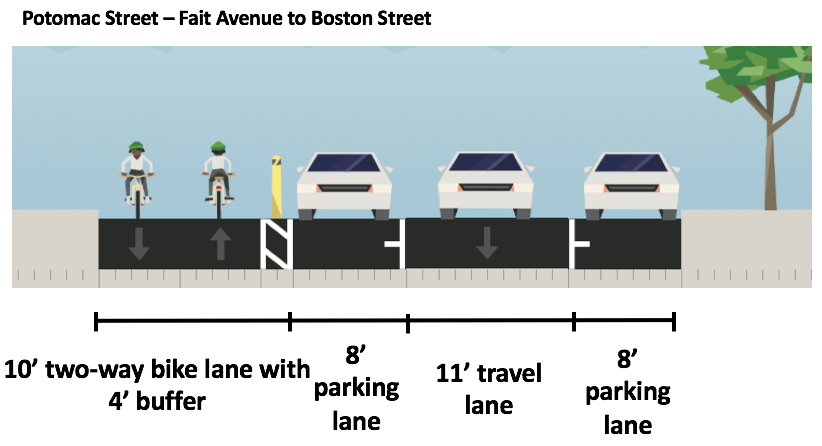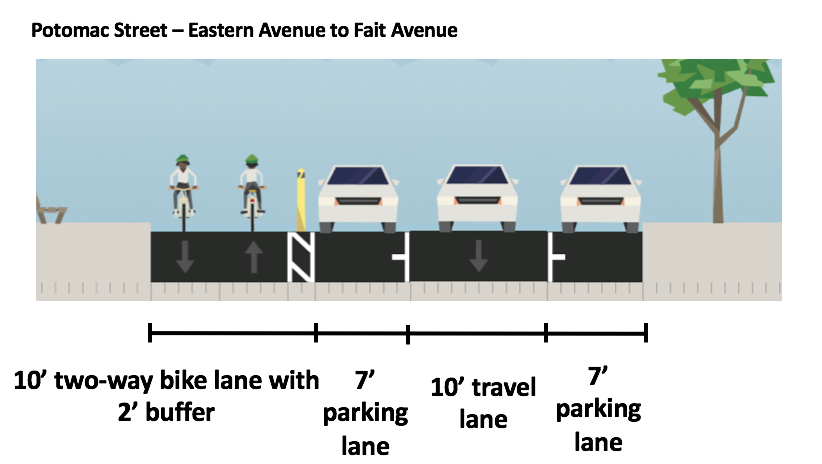by Liz Cornish, Executive Director
I got this question in my inbox last week:
I am on Nextdoor and have seen some vocal individuals that are against the Potomac Ave cycle track. Is this something that could be shut down? I am wondering if I need to worry about them or not.
If your question is should you worry about folks opposed to the bike lane being able to have it removed, my answer is honestly, I don’t know. I do know we’ve been working with the Department of Transportation, the Mayor’s office, Councilman Cohen’s office, and the Canton Community Association to make sure we understand why folks are concerned and that those issues are addressed. DOT has been out on the site numerous times addressing any resident’s valid concerns. They plan to be at the 5/23 Canton Community Association meeting to report out on the construction of the project and discuss ways communication and implementation can be improved in the future. That said, it is Bikemore’s opinion that communication on this project was adequate. Each resident on Potomac received door hangers, multiple public meetings were held over a two year period, and those meetings were well attended. Installation is still a challenge, but we are working with DOT to advocate for improvements that reduce the time that residents are confused about new construction.
Bike lanes are a thing now in Baltimore — something people in Baltimore have been fighting to get moving for years. The opposition is vocal, but most concerns are run of the mill bikelash, something that has been happening and being overcome in other cities for years. Bikelash mostly just represents fear of change. It’s something we now have to navigate as a city that is actually making progress on building out a bike network. But it’s important that those in the neighborhood express their support: to Councilman Cohen, DOT, and the Canton Community Association. It is not a forgone conclusion that the Mayor will continue to make progress in this area. We already have seen instances where leadership within the City are prepared to walk back improvements because they seem unwilling to stand strong on a commitment to safe streets or a transportation vision that goes beyond planning for cars. We will be sending out a targeted email tomorrow to those on our list who live near the facility with instructions on how to show your support and get more information about construction at the 5/23 meeting. (If you're not yet on our email list or haven't provided your home address before, subscribe here.)
The recent behavior I’ve witnessed from some who oppose changes in the public right of way that allocate more space for people who bike is worrisome. Baltimore is facing a public health crisis of immense proportions. The astronomical rates of violence, addiction, and chronic disease are a direct result of our cities inability to address the fact that a significant number of people in this city don’t have access to jobs, safe housing, healthy food, or high quality schools. We have talented local leaders with community based knowledge of what our most vulnerable residents need. We have leading academic research, that comes from our very own anchor institutions that points to public policy solutions to these issues. We know what we need to do. That doesn’t mean the solutions are easy, or that the money to execute on solutions is readily available, or that the legislative or policy solutions to enact these solutions have been created. That is the work — change the laws and the policies so the barriers to implementation are removed, and prioritize the funding of these solutions. But no matter who we elect, or how many forums we convene, we just can’t seem to get to the “doing” part.
You see, addressing root causes — by radically reorganizing our power structures and shifting funding priorities to do so — requires a complete shift in mindset. Our “City of Neighborhoods” mentality may be charming, but the fortress mentality that it creates is holding us back. We have a lot of Baltimore residents who live in relative comfort and safety, that will fight tooth and nail when a parking spot or a tree in their neighborhood is under threat, but will not apply that same level of tenacity or civic mindedness to our most pressing city wide problems. And that’s what I see when I see bikelash. I see a misapplication of concern, talent and resources. I see people mistaking compromises in personal preference or convenience for actual injustice. I see people more concerned with retaining power in a situation, rather than co-creating solutions that still create safety. And I witness how this ties the hands of city employees when they aren’t always granted the political cover to forge ahead on projects that are working toward addressing root causes but receiving public backlash — especially when that backlash comes from wealthy, politically connected constituents.
Good projects create space and opportunity for folks to have input and have their concerns addressed. Good cities have leadership that weigh community input against long range plans for improving the public good and determine the best path forward.
Making the streets safer for people who walk and bike is a public good. And we need to do more. We need to implement plans faster, and we need to ensure that resources for active transportation improvements are distributed equitably. That’s what our Complete Streets legislation seeks to do. That’s creating the policy that allows us to begin to work toward progress.
But bikelash? That’s an old way of doing business in Baltimore that is predicated on this idea that if you're relatively affluent, and politically connected, and shout and threaten to move away you’ll get your way — often at the expense of our most vulnerable citizens. That’s not democratic. That’s not neighborly. That’s not the mindset that will allow us to take on the most important challenges that lie ahead. And if elected officials continue to cave to these temper tantrums rather than following the lead of cities around the world of creating public spaces that work for all modes of transportation, Baltimore will continue to be left behind.
Want to support city wide organizing and coalition building around complete streets?


